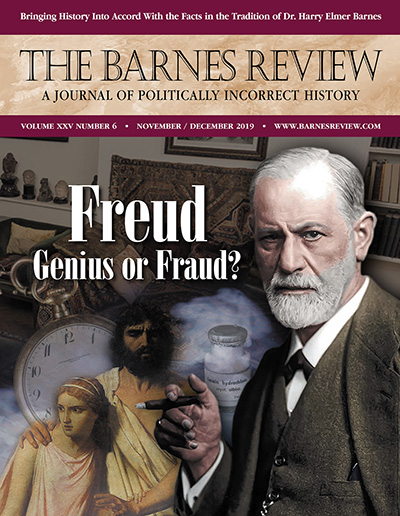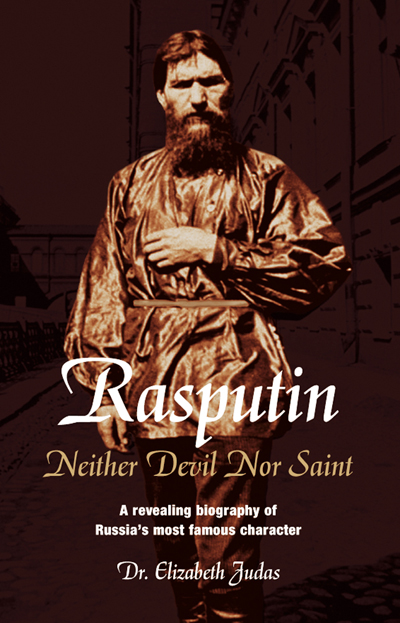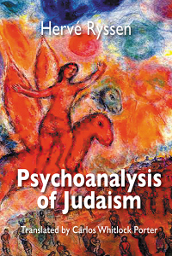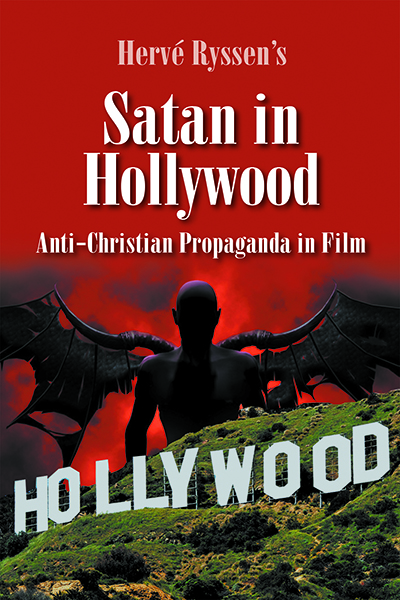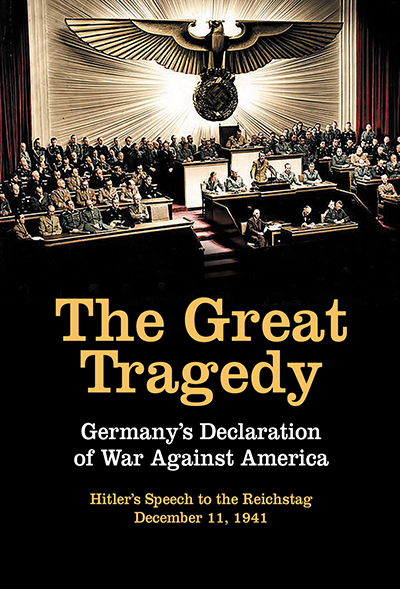Description
The Barnes Review
A JOURNAL OF POLITICALLY INCORRECT HISTORY
NOVEMBER/DECEMBER 2019 ❖ VOLUME XXV ❖ NUMBER 6
TABLE OF CONTENTS
SIGMUND FREUD: GENIUS OR FRAUD?
BY JOHN WEAR, J.D. Sigmund Freud continues to rest on his laurels, but is he really one of the greatest scientists of all time—or was he a charlatan? Were his theories of psychoanalysis a product of his own phobias and mental disturbances?
A PSYCHOANALYSIS OF JUDAISM
BY HERVÉ RYSSEN. Psychoanalysis is mostly a Jewish invention and the admission of non-Jewish doctors into the inner circle of psychoanalysts was frowned upon. But what happens if we turn the tables and do some “head shrinking” on the founders of psychoanalysis?
ETHNIC CLEANSING OF CHRISTIANS
BY ISRAEL SHAMIR. While we are bombarded with stories about the crimes committed against Jews throughout history by Egyptians, Persians, Greeks, Christians, Muslims, “white supremacists,” fascists, neo-Nazis etc., we are rarely allowed to hear about Jewish genocides against others. In this article, Jewish author Israel Shamir tells us about a little-known holocaust committed against Christians in Palestine.
SATAN IN HOLLYWOOD
BY JOHN FRIEND. Of course, here in America, everyone is free to worship as they please. But isn’t devil worshipping going a bit too far? Is it time for patriots to begin boycotting those Hollywood films that denigrate and mock Christianity?
CURSE OF THE CZAR KILLERS: THE FATE OF THE ROMANOV ASSASSINS
BY MIKE WALSH. In this article, we take a look at what happened after the czar and his entourage were murdered. Did a relentless karmic nemesis pursue the killers ruthlessly into madness, misfortune and an early death? Many of them wound up in unmarked graves, deserved victims of the regime they helped usher in.
THE FRENCH REVOLUTION OF 1871: A TEST CASE FOR 1917 RUSSIA
BY MARC ROLAND. Long before the better-known Red revolutions, a communist insurrection was fomented in the French capital of Paris. Vast amounts of property were destroyed, and many lives—particularly of religious people—were lost as a result. In this article, this dry run for the Bolshevik revolution in Russia is examined.
THE ANTI-HUMANS: SOVIET ‘RE-EDUCATION’ IN ROMANIA
BY MATTHEW RAPHAEL JOHNSON, PH.D.. Most people are aware of the horrendous conditions in the gulags of the USSR, thanks to the work of Aleksandr Solzhenitsyn. But there were other torture camps strewn across communist Europe. For instance, the communists in Romania went to extremes to make sure their prisoners were “re-educated.”
WINNIE’S WAR: THE BARBAROUS TACTICS OF GREAT BRITAIN
BY JOHN W EAR, J.D. Winston Churchill was driven to commit any crime necessary in a bid to shore up the collapsing British empire—a bloody mission, full of criminal violence and suppression of human rights, including against Britain’s supposed allies. He was militantly against the working class even of Britain, persecuted the Irish people, bombed Iraq, destroyed India and crushed the Greeks—and that’s only for starters.
A TRIBUTE TO JAMES BACQUE AND HIS WORLD WAR II RESEARCH
BY JOHN W EAR, J.D. James Bacque was the gutsy author of Other Losses and Crimes and Mercies— two historical blockbusters that proved Allied policies led to the needless deaths of 9.3 million non-combatant Germans. In our last issue of TBR, we were fortunate to have been able to publish an interview with Bacque conducted by Bonnie Faulkner. Unfortunately, Bacque passed away in September. Here, we remember him.
Extract from this issue:
Sigmund Freud: Genius or Fraud?
By John Wear, J.D. Sigismund (“Sigmund’) Schlomo Freud has been rated as the sixth most influential scientist in world history.(1) Medical historian Elizabeth M. Thornton writes: “Probably no single individual has had a more profound effect on 20th-century thought than Sigmund Freud.”(2) This article will examine whether Freud deserves such fame.
Freud was born May 6, 1856 at Freiberg in Moravia. As early as 1872, Freud used the signature Sigmund for his first name, and he never used his middle name. Although not religious, Freud insisted that he never lost his feeling of solidarity with the Jewish people. Freud’s Jewish identity was never in question, and he repeatedly acknowledged it publicly.(3) Freud moved to an overcrowded Jewish quarter in Vienna at age four. Freud’s parents both agreed that Sigmund was exceptional and decided to encourage his future greatness in every way possible. He was the only member of his family to have the use of his own room for privacy and study, and he occupied this room until he moved to hospital quarters in his 20s.(4) Freud at age nine enrolled at the newly established Sperl Gymnasium [high school—Ed.] in Leopoldstadt, one year ahead of the normal entrance age.
He was commended for outstanding academic work as well as for his exemplary conduct at the gymnasium. He showed great talent for language and literature, and early mastered Latin, Greek, French, English and later Spanish and Italian. Freud wrote that he was at the top of his class for seven years.(5)
Freud from an early age had a passionate desire to achieve fame, to become a great man and to be, in his own words, a “hero.” Freud relied on his impressive literary skills to create his heroic self. The young boy who had lived in the world of books became a masterful stylist, capable of presenting his ideas in compelling prose. He lived most intensely when he was writing. Freud used his literary skills to shape his personal legend as well as the history of the psychoanalytic movement.(6)
Frederick Crews summarizes the purpose of Freud’ s writings: The aim isn’t to solve a problem but to put Freud himself in the most favorable light, either as a seasoned inquirer, a recognized associate of a leading figure or a discoverer who will soon reveal an important truth. In his drive to become famous for something, Freud saw himself falling behind the most creative and rigorous thinkers in his field. His only recourse was to attach himself sycophantically to great reputations and then to undermine them, leaving himself positioned as our sole guide to a wiser course. (7)
As early as 1885, before Freud had done any work of real significance, he was already concerned with obscuring the details of his life. He wrote to his future wife, Martha Bernays: “I have destroyed all my notes of the past 14 years, as well as letters, scientific excerpts and the manuscripts of my papers. … As for the biographers, let them worry; we have no desire to make it easy for them. Each one of them will be right in his opinion of ‘The Development of the Hero,’ and I am already looking forward to seeing them go astray.” Freud conducted several later purges of his papers and, toward the end of his life, attempted to destroy important letters written in the years of his self-analysis.(8)
SELF-SERVING QUACK
Freud moved into quarters at the Vienna General Hospital in 1882 and spent the next three years acquiring medical experience. His training at the general hospital was the equivalent of what would today be called a medical internship and residency. He acquired familiarity with different conditions and treatment methods in surgery, internal medicine, dermatology, ophthalmology, psychiatry and nervous disorders.(9) Freud opened his medical practice as a neurologist treating disturbed human beings on Easter Sunday in 1886. His new medical practice grew very slowly.(10)
Freud’s preoccupation with the financial status of his patients was incessant during his first years of doctoring. This led him to accept patients patients he should have referred to other doctors.(11) For example, Hugo Thimig, a well-known local actor, contacted Freud in May 1886 complaining of dysfunction and pain in his wrist. Instead of referring Thimig to a qualified orthopedic surgeon, Freud applied his scalpel to Thimig’s wrist despite his lack of surgical skill. Predictably, the operation was unsuccessful. Freud had overridden normal medical precautions and placed Thimig’s health in needless jeopardy.(12)
Like other physicians of his time, Freud relied on pain-deadening drugs to treat both ordinary anxiety and a number of other conditions. What distinguished Freud from most of his fellow doctors was the use of cocaine as his panacea of choice. Neither the disastrous use of cocaine to attempt to help his friend Ernst Fleischl von Marxow, nor the warnings appearing in the medical press deterred Freud from continuing to medicate his patients with cocaine.(13)
Continued . . .
ENDNOTES:
1 www.adherents.com. Key words: “100 Scientists.”
2 Thornton, E. M., The Freudian Fallacy: An Alternative View of Freudian Theory, Garden City, NY: The Dial Press, 1984, p. ix.
3 Noland, Richard W., Sigmund Freud Revisited, New York: Twayne Publishers, 1999, pp. 1-2.
4 Ibid., pp. 2-4.
5 Breger, Louis, Freud: Darkness in the Midst of Vision, New York: John Wiley & Sons, Inc., 2000, p. 30.
6 Ibid., pp. 2-3.
7 Crews, Frederick, Freud: The Making of an Illusion, New York: Metropolitan Books, 2017, p. 235.
8 Breger, Louis, Freud: Darkness in the Midst of Vision, New York: John Wiley & Sons, Inc., 2000, p. 1.
9 Ibid., pp. 62-64.
10 Ibid., p. 86.
11 Crews, Frederick, Freud: The Making of an Illusion, New York: Metropolitan Books, 2017, pp. 242, 248-249.
12 Ibid., pp. 248-249.
13 Ibid., p. 249.
JOHN WEAR was born in 1953 in Houston. He graduated with a degree in accounting from Southern Methodist University in 1974 and passed the CPA exam later that year. He graduated from the University of Texas Law School in 1977 and passed the Texas bar in 1978.
